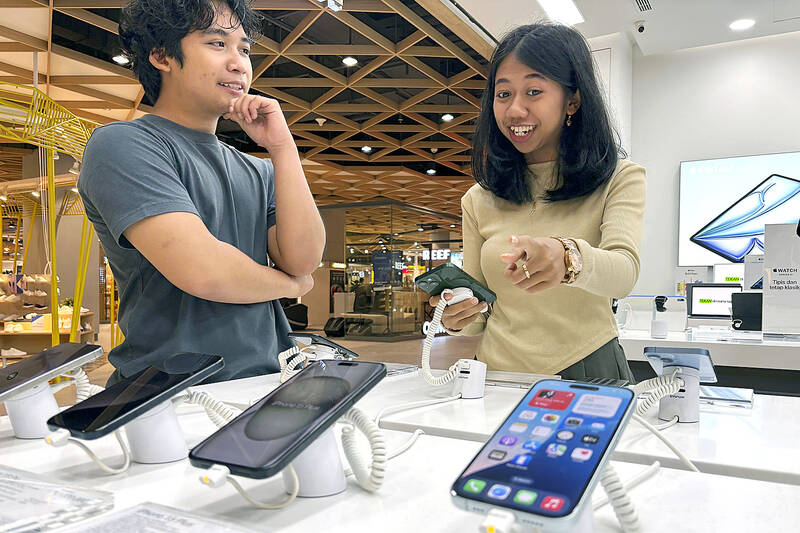Apple Inc has signed an agreement with Indonesia to invest in the country, paving the way for sales of the iPhone 16 to resume in Southeast Asia’s largest nation.
The agreement was announced yesterday by Indonesian Minister for Industry Agus Gumiwang Kartasasmita in a media briefing in Jakarta. The ministry would begin a process to issue Apple with a permit allowing it to sell its latest smartphone, news outlet Kompas reported.
The pact is set to end a five-month tussle that started in October last year after Indonesia refused to issue a sales permit to Apple, citing its failure to comply with domestic manufacturing requirements for smartphones and tablets.

Photo: EPA-EFE/MADE NAGI
Apple then pledged to invest US$1 billion in Indonesia, an offer Indonesian President Prabowo Subianto directed his ministers to accept. However, the Ministry of Industry last month unexpectedly upheld the ban, as it sought better terms.
The deal is a win for Indonesia, with its hardball tactics paying off to get a major foreign company to invest more to develop its goods in the country and boost local manufacturing, instead of merely using the nation as a sales hub.
The government had previously said that Apple had invested only about US$95 million in Indonesia.
The agreement also comes at an opportune time for Prabowo. The optics of a US tech giant yielding to his administration could be used to boost his domestic standing, which has taken a hit following multiple policy U-turns that have generated confusion. On top of that, his plan for sweeping spending cuts that threatened jobs and scholarships triggered days of protests last week.
For Apple, the deal gives it access to Indonesia’s massive consumer market at a time when sales in China have slowed. Though Apple ranks outside the top five smartphone brands in Indonesia, the country’s population of 278 million people — more than half of whom are under the age of 44 and tech-savvy — is too good an opportunity to miss.
The agreement includes the establishment of a plant on the Indonesian island of Batam to produce AirTags, a device that allows users to track their luggage, pets or other belongings, according to Kartasasmita. Apple is bringing on board one of its significant suppliers, Luxshare Precision Industry Co (立訊精密), to operate the plant.

To many, Tatu City on the outskirts of Nairobi looks like a success. The first city entirely built by a private company to be operational in east Africa, with about 25,000 people living and working there, it accounts for about two-thirds of all foreign investment in Kenya. Its low-tax status has attracted more than 100 businesses including Heineken, coffee brand Dormans, and the biggest call-center and cold-chain transport firms in the region. However, to some local politicians, Tatu City has looked more like a target for extortion. A parade of governors have demanded land worth millions of dollars in exchange

An Indonesian animated movie is smashing regional box office records and could be set for wider success as it prepares to open beyond the Southeast Asian archipelago’s silver screens. Jumbo — a film based on the adventures of main character, Don, a large orphaned Indonesian boy facing bullying at school — last month became the highest-grossing Southeast Asian animated film, raking in more than US$8 million. Released at the end of March to coincide with the Eid holidays after the Islamic fasting month of Ramadan, the movie has hit 8 million ticket sales, the third-highest in Indonesian cinema history, Film

Taiwan Semiconductor Manufacturing Co’s (TSMC, 台積電) revenue jumped 48 percent last month, underscoring how electronics firms scrambled to acquire essential components before global tariffs took effect. The main chipmaker for Apple Inc and Nvidia Corp reported monthly sales of NT$349.6 billion (US$11.6 billion). That compares with the average analysts’ estimate for a 38 percent rise in second-quarter revenue. US President Donald Trump’s trade war is prompting economists to retool GDP forecasts worldwide, casting doubt over the outlook for everything from iPhone demand to computing and datacenter construction. However, TSMC — a barometer for global tech spending given its central role in the

Alchip Technologies Ltd (世芯), an application-specific integrated circuit (ASIC) designer specializing in server chips, expects revenue to decline this year due to sagging demand for 5-nanometer artificial intelligence (AI) chips from a North America-based major customer, a company executive said yesterday. That would be the first contraction in revenue for Alchip as it has been enjoying strong revenue growth over the past few years, benefiting from cloud-service providers’ moves to reduce dependence on Nvidia Corp’s expensive AI chips by building their own AI accelerator by outsourcing chip design. The 5-nanometer chip was supposed to be a new growth engine as the lifecycle